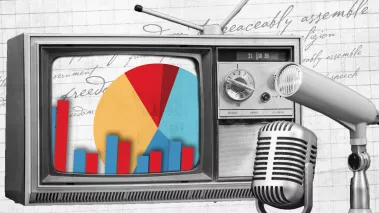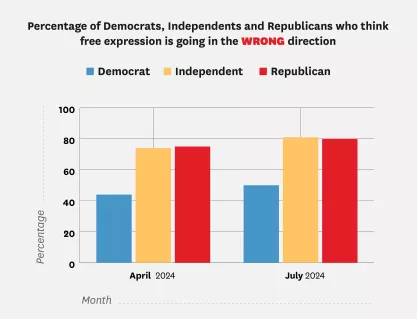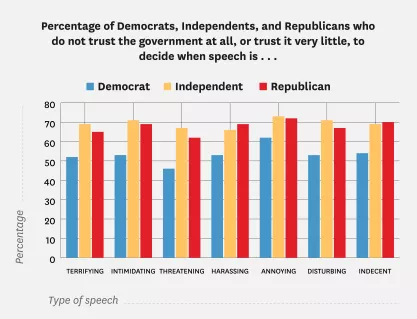Table of Contents
Americans don’t trust the government to regulate speech

Most Americans, including a majority of Democrats and Republicans, are losing confidence in the future of free speech in America.
And that's not the only instance of partisan agreement the third installment of FIRE's National Speech Index reveals. Released today, the survey also found that Americans do not trust the government to fairly decide what speech is annoying, disturbing, harassing, indecent, intimidating, terrifying, or threatening. And they are not comfortable with the government limiting the speech of pro-Hamas protesters.
Americans believe free expression is heading in the wrong direction
More than two-thirds of Americans (69%) said free expression is going in the wrong direction in the country — an increase from 63% in April. This lack of faith in the future of free speech is fairly consistent across Americans of all political persuasions.
Three months ago, a majority of Democrats felt that free expression was going in the right direction in America. Now, Democrats are evenly split on the matter, with half saying free expression is going in the wrong direction. A similar shift is evident among independents and Republicans.

Americans don’t trust the government to regulate speech
When it comes to regulating speech, Americans agree that more government intervention is not the answer. The percentage of Americans who do not trust the government “at all” or only trust it “a little” to decide what speech is annoying, disturbing, harassing, indecent, intimidating, terrifying, or threatening ranges from 58% (for “threatening”) to 69% (for “annoying”).
Majorities of Democrats, independents, and Republicans have little-to-no trust in the government to decide what speech falls into these categories. However, a little more than half of Democrats (54%) trust the government “at least somewhat” to decide what speech is threatening. Across the survey questions, higher percentages of Democrats than independents or Republicans tended to report trusting the government.

More than two-thirds of Americans (70%) said they are “not at all” or “not very” comfortable with the United States limiting the free speech rights of people publicly protesting in support of Hamas. This includes 76% of Democrats, 69% of Independents, and 58% of Republicans.
Some Americans oppose campus protests despite distrust in government regulating speech
In the 10 months since the first Israeli-Palestinian campus protests, Americans remain divided on issues related to college student protests responding to Israel’s actions in Gaza.
Forty percent of Americans overall reported opposing the student protests: 26% said they “strongly oppose” them and 14% said they “somewhat oppose” them. As for whether colleges and universities should direct police to arrest student protesters who oppose the war in Gaza or allow the protests to continue as a matter of free speech — or neither — a plurality of Americans (38%) support allowing the protests to continue.

National Speech Index
Reports
The National Speech Index is an ongoing weekly survey conducted by the Polarization Research Lab, which will allow researchers to track shifting free speech sentiment in America over time.
However, almost half of Republicans (46%) support colleges and universities directing police to arrest the protesters while only about a fifth of Democrats (21%) support this statement. The rest reported being unsure.
Conclusions
The evidence collected and presented above showcases the concerns that Americans have about the state of free speech in the nation today. The results are alarming, with a large number of Americans from each political side lacking confidence in the future of free speech.
FIRE may not be able to foretell the future of free speech in the United States, but we will continue conducting research that provides insight on emerging trends. We look forward to discussing next quarter’s survey results.
Recent Articles
FIRE’s award-winning Newsdesk covers the free speech news you need to stay informed.

Harvard stands firm, rejects Trump administration’s unconstitutional demands

FIRE comment to FCC calls for review of regulations that may violate the First Amendment

FIRE statement on immigration judge’s ruling that deportation of Mahmoud Khalil can proceed


